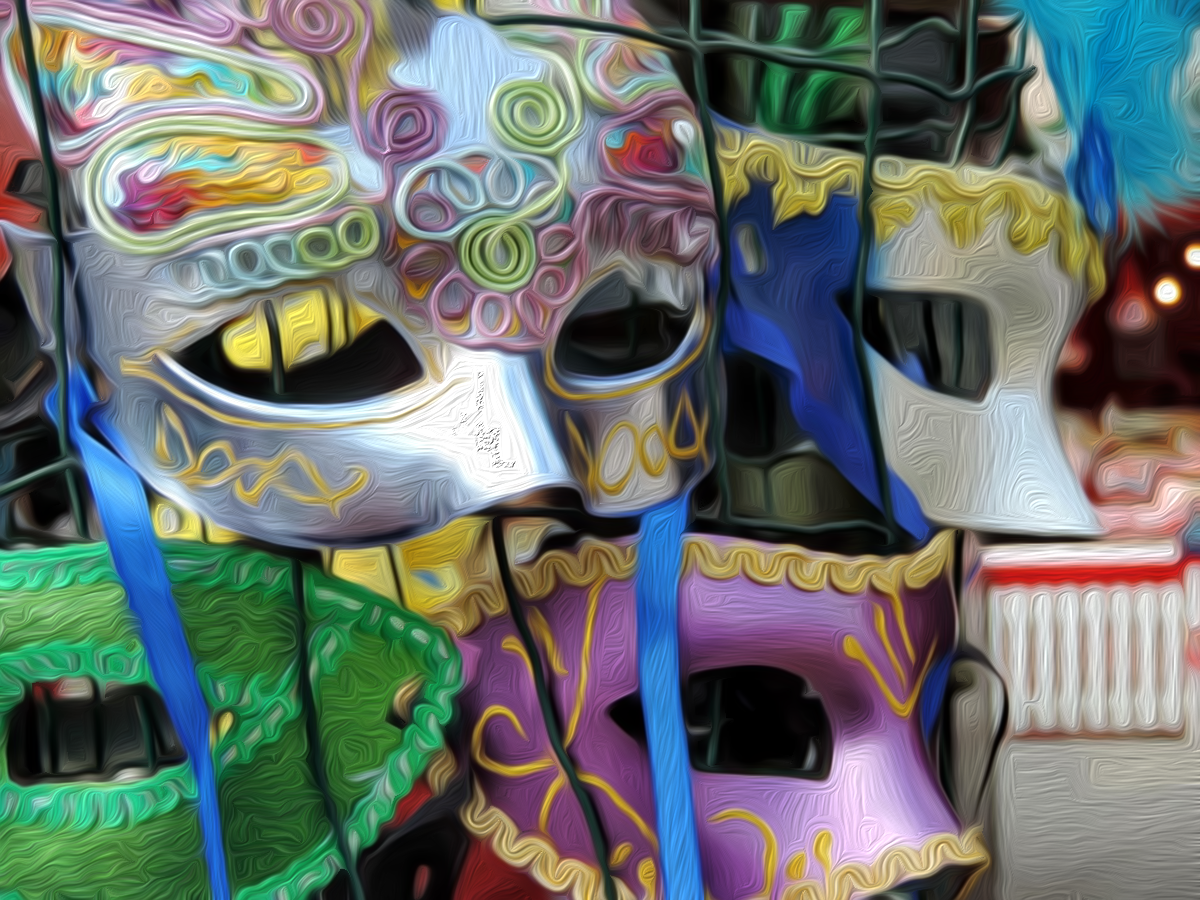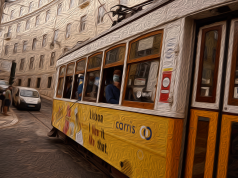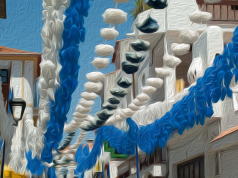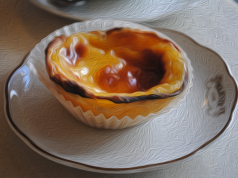Portugal is known for its rich cultural heritage and traditional festivals, which play a significant role in the country’s history and society. In Portugal, while some holidays are national holidays, some other holidays and celebrations are held regionally.
You’ll find that there are many festivals in Portugal held throughout the year. Some of them are music festivals, pride events, dance, and food festivals. Many of the towns and villages in Portugal celebrate their own festival (festa) as well. These events are to celebrate Portuguese culture, religion, and history.
In this article, you’ll find more about Portugal festivals including the popular and regional ones.

Popular Festivals in Portugal
You can be sure that you’ll find some festivals being celebrated no matter when you visit Portugal. Festivals in Portugal take an important place among the locals because they take their roots in Catholic tradition and pagan customs. As a result of this, many Portuguese people believe in healing spirits, saints, cults, and miracles strongly. So, they keep on celebrating such events every year.
Traditional celebrations in Portugal’s festivals often involve dancing, singing, and parades. For example, the São João Festival features a parade of people dressed in traditional clothing. Or, the Festa do Avante includes live music performances and political speeches.
Food and drink are also an important part of Portugal’s festivals, with traditional dishes and drinks often served during the celebrations. Popular festival foods include grilled sardines, roast pork, and cod dishes. Drinks like port wine and ginjinha (cherry liqueur) are also commonly enjoyed. Whether it’s a national or regional celebration, you can see that food and drinks take an important place for the Portuguese. You can also see vendors serving bread, sweets, wine, or sausages during a Portugal festival.
Let’s now look at the most popular Portuguese festivals.
Carnaval Festival
Carnaval is a very popular Portuguese festival that is celebrated in different ways by different communities. Its history dates back centuries ago when people used to eat meat in big feasts.
The one celebrated in Parque Nacoes in Lisbon is the biggest of them. Carnaval in Algarve is also one of the best to see. People in Algarve sail the traditional boats by the coastline at this festival. At this festival, you can see masks, costumes, parades, and theatrical performances altogether.
The festival starts on the last Friday before Lent which is the period of 40 days before Easter. It ends on Shrove Tuesday.
Festa de São João in Porto
Festa de São João is a Portuguese festival held in June. It involves paying tribute to Saint John the Baptist, and it has been celebrated for over 600 years. People celebrate the festival with street parties and music. It lasts until late in the night, and some even keep on celebrating until dawn.
A common element of this celebration is hitting each other’s heads with plastic hammers. Sky lanterns and balloons are also released into the air at this festival.
NOS Primavera Sound
NOS Primavera Sound is one of the most popular music festivals held in Portugal, and it’s sponsored by NOS. The festival is held every June, and it’ll be between June 7-10, this year. You can enjoy the performances of many groups and singers in this three-day festival.

Super Bock Super Rock
Super Bock Super Rock is another popular music festival in Portugal, dating back to 1994. It lasts for three days, and it’s held in Parque das Nações in Lisbon, by the river. You can find a collage of different music genres like metal and rock at this festival. There are also many bars and restaurants you can discover around the area. Also, you can visit lots of museums nearby to enjoy your time during this three-day period.
São Martinho
São Martinho, also known as Saint Martin’s Day, is an important religious holiday in Portugal. It’s a day to honor St. Martin who was a Roman soldier cutting his cloak in half to give it to a beggar. Legend has it that the sun came out after this.
It’s celebrated every November 11 by roasting chestnuts. Also, people organize a big party with a bonfire. It’s also the day when people taste the first wines of the season. Also, you’ll find that special menus and events are offered by Portuguese restaurants on this day.
Some of the most traditional Saint Martin’s Day festivals are held in:
- Trás-os-Montes,
- Golegã,
- Beira Baixa, and
- Penafiel.
Feast Day of Saint Anthony
It’s a festival held on June 12 in the Alfama district of Lisbon. It’s one of the most lively festivals in Portugal with streamers and lights. On the streets and in restaurants, sardines are grilled. There are also music, dance, beer, and wine for everyone on the streets at this day. A colorful parade also takes place along Avenida da Liberdade.
There’s a story of this tradition: a fish comes out of the sea to listen to the saint while the locals wouldn’t. Saint Anthony is also known as the saint of marriage. As a tradition, men offer basil to whom they love on this day. There’s also a love message within a paper carnation accompanied by the basil.
Let’s now look at the regional Portugal holidays below.
Regional Festivals in Portugal
Regional festivals in Portugal are as important as the popular ones. In Portugal, each village and town has its patron saint. On their saint’s day, each of them celebrates it as a community. In this way, their sense of being a community and nation is also cherished.
At these festivals, a procession of a patron saint’s statue takes place. There are dancing, music, fireworks, and wine everywhere on these special days.
Among the countless regional festivals and holidays in Portugal, some of them are listed below:
- The Entrudo dos Compadres: This is a very buoyant carnival that takes place in Lazarim. At the festival, you can see people with masks and fireworks. There are also straw dolls being made and brought to the festival. There are young men and women at this festival, and their performances differ depending on the region of the festival.
- National Agricultural Fair: This is a nine-day agricultural festival accompanied with food and music in Santarem. Folk songs are played, and people sing and dance as well. It takes place every June, and bullfights are also performed. The festival celebrates agriculture and handicrafts as well as cattle raising.
- Procissão do Senhor Senhor Ecce Homo festival: It’s an Easter festival celebrated in Braga on Holy Thursday. It takes 10 days. People bear torches and hooded penitents walk through the streets together. Each year, thousands of people attend this festival. A procession, symphonic concerts, and biblical pageants also take place during this 10-day festival.
- Semana Santa celebrations in Obidos: This is one of the spectacular Semana Santa celebrations in Portugal. The festival lasts two weeks. Different performances take place during the day and at night. In the daytime, a Christ figure wears a crown of thorns and carries a cross. In this way, a reenactment of the crucifixion takes place. At night, torchlight processions are performed. In Braga, similar activities take place at Semana Santa celebrations. It lasts a week in Braga, and you see barefoot men wearing hoodies and walking.
- Fantasporto International Film Festival in Porto: This is one of the oldest film festivals in Portugal. It has been celebrated in Porto since 1981. This year, it’ll take place between Feb. 24-March 5.
- Madeira Wine Festival: This is a wine festival taking place each year at the beginning of September. The harvest takes place throughout Madeira at that time. At the festival, you can taste wines, enjoy concerts, and even squash grapes with your feet! It’ll take place between Aug. 31 and Sep. 17 this year.
- The Queima das Fitas: It’s a festival celebrated in Coimbra by the students of the town. It’s a century-old festival celebrated in May. Students burn gowns and ribbons and enjoy fado and parades during the festival period. It’s also held in Porto with a different version.
Conclusion
In short, these festivals reflect Portugal’s unique cultural heritage and are an important part of the country’s traditions and customs. You will probably come across at least one of them whenever you visit Portugal.
FAQ
What are the Portugal holidays?
The holiday dates in Portugal in 2023 are:
- New Year’s Day,
- Liberty Day on the day after the 24th of April national day,
- Labor Day on May 1
- Dia de Camões (Portugal Day) on June 10
- Dia de Santo António on June 12-13
- Corpus Christi on June 16
- Assumption Day on Aug. 15, as one of August celebrations
- Republic Day on Oct. 5
- All Saints’ Day on Nov. 1
- Feast of the Immaculate Conception on Dec. 8
- Christmas Eve on December 24, and
- Christmas Day (Natal Day) on Dec. 25.
Is there an Aug 13 national day in Portugal?
Some festivals and fairs take place in August in Portugal. However, Portuguese National Day (Dia de Camões) is on June 10.
What are the other Portuguese festivals to be held in 2023?
Each Portuguese festival 2023 is listed below:
- January 6: Epiphany
- February–March: Carnival, which is also known as Entrudo
- March 19: St. Joseph’s Day (Dia de São José) in Santarem
- April 2–9: Holy Week (Semana Santa)
- April 7–9: Easter weekend
- May–September on Sundays: Somersby Out Jazz in Lisbon
- May 19–26: Queima das Fitas (Burning of the ribbons) in Coimbra
- All June: Festas de Lisboa in Lisbon
- June–October: International Garden Festival in Ponte de Lima
- June 12–13: Dia de Santo António (St. Anthony’s Day ) in Lisbon
- June 16: Corpus Christi
- June 17–25: Arraial Pride in Lisbon
- July 1–23: AgitÁgueda in Águeda
- August 9–12: Sudoeste Festival
- September 8–17: Our Lady of Nazaré Festival as part of the September 17 holiday
- September–October: Festival de Sintra, and
- December 8: Feast of the Immaculate Conception.
Are there special Nazare holidays?
Any national official Portugal day covers the whole country.
Is there a Santo August holiday?
August 15 is Assumption Day, and closures apply. Religious processions take place on this day of Portugal schedule as well.
When was the day of Portugal 2023?
The Day of Portugal is on June 10, Thursday in 2023.






